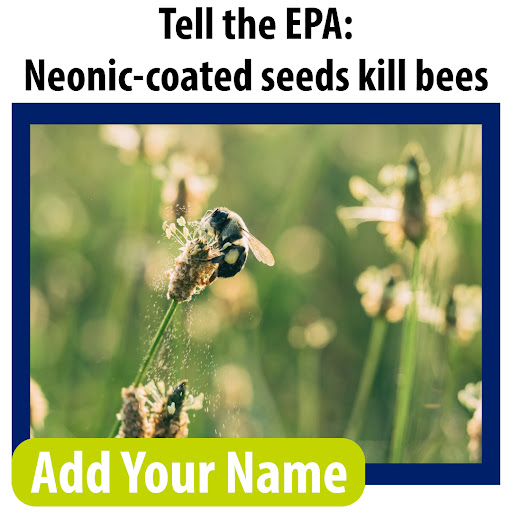

 |
John,
We need to protect pollinators from pesticides. But an egregious Environmental Protection Agency (EPA) loophole has left out one of the most widespread uses of bee-killing pesticides -- seeds coated with neonicotinoids.1
Toxic pesticide-coated seeds are killing the bees and birds that we love and endangering essential pollinators.
Tell the EPA: Protect bees and birds from toxic seeds.
Neonic-coated seeds remain a huge gap in the EPA's pesticides program, and it's having deadly consequences for bees and birds.
A single seed treated with neonicotinoids (neonics) can kill a songbird.2
And from planting to bloom, the neonic-coated seeds are harmful to bees. Toxic clouds of pesticides get churned up during the planting process, settling over bee habitat and potentially poisoning them.3
Then, the planted seeds grow into flowering plants that become laced with pesticides -- root to petal. The flowers' nectar and pollen, which bees need to survive, is contaminated with bee-killing neonics. And a tantalizing flower becomes a toxic feeding ground for a tiny bee.
We need to convince the EPA to regulate these toxic seeds. And right now, the agency has an open comment period for you and thousands of other activists to make your voices heard.
Urge the EPA to regulate neonic-coated seeds.
These toxic seeds are used across much of our landscape. Every year, 150 million acres of U.S. soil are planted with pesticide-coated seeds that kill bees.4
But in many cases, neonics aren't even necessary to deal with a pest problem. Seed companies coat common seeds in neonics by default, and farms end up using them whether they need to or not.5
Sometimes it's good to tackle a problem preemptively. But planting pesticide-coated seeds creates more problems than it solves. Why would we put toxins into millions of acres of soil, poisoning the world around us and killing the very pollinators that help our crops to grow?
It's an absurd situation that's contributing to the collapse of bee colonies and creating an increasingly toxic environment for bees.
To limit toxic bee-killing pesticides, we're up against powerful companies in the agricultural industry that have a lot of influence. The fact that the EPA is even considering closing this loophole is a testament to the power of grassroots action from people like you, John.
By collecting thousands of petitions and raising the profile of this issue, our message is getting through to the EPA and they're considering action.
Now's the time to make sure the EPA follows through and limits pesticide-coated seeds. And if we're successful, it will make a big difference for the little bees counting on us to save them from toxic seeds.
Submit your comment before Dec. 11 to close the pesticide-coated seed loophole.
Thank you for raising your voice,
Ellen Montgomery
1. Elizabeth Royte, "These widely used insecticides may be a threat to mammals too," National Geographic, February 5, 2021.
2. Kimberly A. Stoner, "Best Management Practices for Farmers Using Seeds Treated With Neonicotinoid Insecticides," Connecticut Agricultural Experiment Station, January 1, 2017.
3. "Corn seed treatment insecticides pose risks to honey bees, yield benefits elusive," Purdue University, May 22, 2017.
4. Elizabeth Royte, "These widely used insecticides may be a threat to mammals too," National Geographic, February 5, 2021.
5. John F. Tooker, "Farmers are overusing insecticide-coated seeds, with mounting harmful effects on nature," The Conversation, February 22, 2022.
Donate today. A cleaner, greener future is within our reach. Your donation today can help us bring the vision we share a little closer to reality.
Environment Colorado, Inc.
1543 Wazee St., Suite 400, Denver, CO 80202, (303) 573-3871
Member questions or requests call 1-800-401-6511.
Facebook | Twitter
If you want us to stop sending you e-mail then follow this link -- Unsubscribe